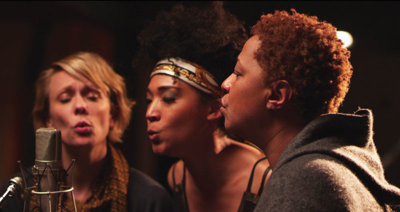You get a sense of both joy and sadness when you watch 20 Feet From Stardom, a rousing yet melancholy tribute to the background singers whose harmonious voices have made appearances all over 20th century popular music.
You get the predominantly black, predominantly female performers jubilantly singing their hearts out, whether it's during their youthful creative prime (assembled via archival footage) or during the stripped-down yet still emotional performances director and music documentarian Morgan Neville captures on camera. You also get their sorrowful stories about how they were forced to remain in the background even when they wanted to step out front and center.
A favorite at this year's Sundance Film Festival, Stardom is cinematic nirvana for people who love to see the unsung heroes who helped define American pop music finally tell their story. Most of these women came straight from the church — gospel-singing pastors' daughters whose joyful noise-making tendencies began slipping into pop songs, in unorthodox contrast to how white backup singers (referred to in the movie as "the readers") stiffly did their jobs. According to the movie, it all began with West Coast trio the Blossoms, led by a teenage Darlene Love, whose wagging hips and soulful vocals made them in-demand singers. They sang on everything from Frank Sinatra tunes to that novelty hit "Monster Mash."
Love and her crew led the way for other gals to get some studio time. The most divalicious of them is Merry Clayton, a former member of Ray Charles' Raelettes who became Mick Jagger's immortal duet partner on the Rolling Stones' "Gimme Shelter."(She recalls how she was awoken in the middle of the night to record with them, turning out a couple of hellafied takes in her pajamas.) Clayton says it was grateful Brits like the Stones, Joe Cocker and David Bowie (who had a then-unknown Luther Vandross do backing vocals on his Young Americans album) who gave these singers the most freedom, encouraging them to bring out the blackness these Englishmen openly copped for their music.
As fun as the '60s and '70s were hanging with those guys, these singers still wanted to make it big back in the States — and this is where the sadness comes into the story. As talented and most relied-upon as these ladies are, their moments in the spotlight were usually dimly lit affairs. Years of being screwed over by Phil Spector — her vocals often appeared on Spector-produced songs credited to other artists before he trapped her in a nightmarish recording deal — led Love to leave the game entirely and begin a second career as a maid. Clayton, who played a maid with singing aspirations in the long-forgotten Ally Sheedy movie Maid to Order, had a brief but powerful solo career in the '70s that sadly didn't take off. The same goes for Lisa Fischer, a multi-octave riffer whose Grammy-winning, '90s solo career quickly fizzled out.
Although the movie never comes out and says it, it's quite obvious that being black and female in the music industry — hell, any entertainment industry — usually does not make success easy. Some would say it could downright handicap you. As I look back at all the black female pop stars who ruled for an era, only to get dethroned by the next special sista (Diana begat Aretha, who begat Whitney, who begat Mariah, etc.), it seems our culture can only take one brown-skinned diva at a time. While it's apparent throughout the movie that these women have skills, that sadly didn't guarantee them fame and fortune — especially when there were other A-list, black-girl singers out there amassing audiences. Even though they were primed and ready for the moment in the sun, the rest of the world wasn't.
Neville gets plenty of past and present background singers to talk about their experiences: Patti Austin, Lynn Mabry, Tata Vega, Claudia Lennear, Judith Hill, not to mention the Waters family, whose credits include both Michael Jackson's Thriller album and the theme from Growing Pains. We also get Bruce Springsteen, Bette Midler, Sting, Stevie Wonder and former Jackson backup singer Sheryl Crow going on record to say how much the show can't go on without them. 20 Feet From Stardom is a stunning salute to the singers who stay in the background, but whose talents could never be contained there.
For three consecutive Sundays, after the 5:25 p.m. show, The Belcourt will feature post-film Q&As with some of Nashville's highest-profile backup singers. This Sunday, June 30, there'll be a post-screening discussion with singers who spent many years on the road singing with Wynonna Judd, among others: Vicki Hampton, Bob Bailey, Kim Fleming and Wendy Moten. On Sunday, July 7, the discussion features Marcia Ware (Alison Krauss, Chaka Khan, Hall and Oates); Shaun Murphy (Bob Seger, Eric Clapton, Meat Loaf); and Carmella Ramsey (Kid Rock, James Taylor, Carly Simon). Guests for Sunday, July 14, are Kim Parent (Brooks & Dunn, Lionel Richie, Faith Hill); Marcia Ramirez (Rodney Crowell, Tanya Tucker, Lee Ann Womack); and Britt Savage (Garth Brooks, Tony Bennett, Donna Summer).
Email arts@nashvillescene.com.





